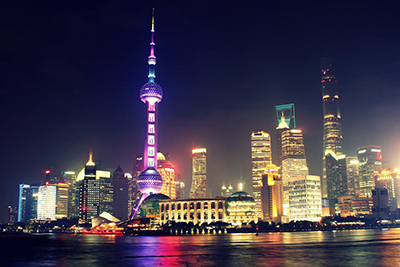What is the consumer experience like in China’s big urban centers such as Shanghai? One word comes immediately to mind: choice, created by lots of disposable income. These cities are a jolting contrast to China’s vast, rural areas where people have to often live on less than $2 a day.

Shanghai, land of Lamborghini and Louis Vuitton, is something of a special case because it’s China’s richest city in addition to being a financial and international trading center. It is relatively open to new ideas, investment and products—and thus a magnet for foreign businesses and brands. U.S. brands have a large presence here, especially in franchise hotels and restaurants. Where foreign majority ownership is allowed, you’ll find plenty of Americans there, too.
Chinese young people are avid consumers of goods of all kinds, and spend a lot time looking for and buying products online. They’re supported in doing so by a digital payments backbone that is perhaps the most advanced in the world. You can pay for just about everything with your smart phone, including ticketless entry to the city’s public transport system.
Many businesses now make it clear to customers that they no longer accept cash. It’s either ubiquitous Alipay, a service of the e-commerce giant Alibaba, or nothing. One can only marvel at the daily revenue generated by Alipay from even a tiny cut of these millions of swipes, not only in Shanghai, a city of 23 million, but in megacities throughout the country. Of course you can do more than marvel, you can own a piece of it, as a publically traded company on the New York Stock Exchange.
Bike sharing gridlock
Also available via app are bicycle rentals. Long lines of bikes from competing companies line the already crowded sidewalks. Rentals are cheap, usually less than a dollar, but it’s the scale—millions of daily trips—that has generated competition. A number of companies have gone bankrupt, taking customers’ $300 deposits with them and generating multiple lawsuits. Other people complain about the piles of bikes left on sidewalks in a tangled heap and local authorities may have to regulate, though they’ve been reluctant so far.
Need a delivery of a bowl of soup dumplings or some other item? An army of delivery people riding motor scooters will speed to your door in whatever high rise or back alley you may be waiting. No need to join the jostling crowds if you don’t want to.
China has its own GPS system, exploited by car-sharing services which until recently included Uber. The competition became too much even for Uber, which sold its business and pulled out of the country last year. The dominant player now has a new competitor, which uses it software to enable people seeking rides to contact any unaffiliated driver willing to provide one. Uber may be out, but Airbnb, the living space rental tech company, is very much in, with no local rival so far. Google, also once out, is getting back in, this time in the area of artificial intelligence. Facebook, also out, is attempting a comeback, and founder Mark Zuckerberg has been seen running laps near the Forbidden City in Beijing and giving speeches in Mandarin to business groups. The Chinese culture appreciates persistence.
China is also interested in the convergence of AI, driverless vehicles and Big Data. The government has plans to be the global leader in these areas and is spending heavily on R&D. Already, its data companies are quite advanced in data gathering and crunching. They’re using this data, for example, to improve the online shopping experience, especially for millennials. Not understanding how advanced mathematics fits into all of this, your correspondent quizzed a graduate student at Shanghai’s Fudan University. She’s studying topography, a scientific field which among other things contributes to facial recognition technology with applications for cyber security but also for shopping.
Saving face
How? Through facial recognition, you can take an image of your face and an algorithm will show you what you look like with various kinds of lip glosses, concealers, eye shadows and other kinds of products. While you’re choosing, the technology offers selections of clothing items that will look good on you based on similar looking faces in a database.
Not all consumers are thrilled with these technological advances, and part of the concern comes from the fact that they know the omnipresent state has access to this data, thanks to the familiar relationship between private sector and government security organizations. Consumers may have lots of choices in today’s humming China consumer culture but the government can know about these choices. People are starting to complain about the lack of privacy in their online lives and data companies like Alibaba and Tencent, owner of the popular WeChat messaging app, have taken notice. Whether public opinion will lead to fewer intrusions on personal privacy remains to be seen.
For now, the huge video screens at nearly every major Shanghai intersection, promote a lifestyle full of products, glamor, youth and fun. The intended audience was not alive 40 years ago when Shanghai was a much quieter town with few cars and where the height of fashion was a Mao suit in blue or green.
( Melissa )17 Apr,2018


